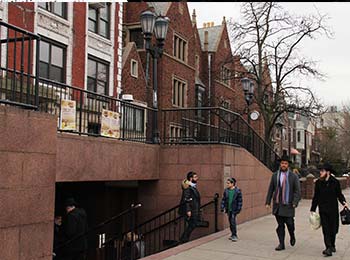NEW YORK — Not much has changed at the Chabad-Lubavitch Headquarters since Dec. 9, when a man burst into the main library at 770 Eastern Parkway and stabbed a 22-year-old yeshiva student in the head.
These days, there’s a police cruiser sitting outside the building at all hours—but there always has been one, even before the attack, according to the nonchalant officer on duty.
If anything, the atmosphere is festive, with Chanukah decorations and street-side vendors on Kingston Avenue selling tinsel decorations and golden chanukiyot.
One thing that has changed, however, is the open-door policy at the headquarters, commonly called “770” for its address. The staff has begun, once again, to lock the front doors at night. “When things like this happen, a lot of things come into review,” says Motti Seligson, a Chabad spokesperson. “Security is one of those things.”
But it’s a cosmetic difference: the building is still open 24/7, and yeshiva students still sit among the wooden benches in the bottom-floor library at all hours.
And the community has not grown more suspicious. Chassidic members of Brooklyn’s Crown Heights neighbourhood are generous with their time and enjoy chatting with strangers. But ask about the aftermath of Dec. 9, and their faces change – they look alarmed, sad, maybe a little annoyed that random violence is what’s attracting attention. There is a palpable tension in the air. They would rather discuss the Messiah, the Rebbe, their studies and prayers. “Everyone makes their own calculations,” one woman tells me. “Some are praying more, some are performing mitzvot, some are asking God, ‘Why?’”
Cellphone video footage of the attack is on YouTube. It doesn’t show the stabbing of Israeli student Levi Rosenblatt, but it does show Calvin Peters, 49, – who struggled with a history of drug-related arrests and bipolar disorder, it was later revealed – staggering around the 770 library, taunting cops and students, “You want me to kill you?”
University-aged yeshiva students scrambled around the room, hiding behind bookshelves, pleading for police not to shoot the man. It was 1:40 a.m., and the room was dark and fairly empty. “Drop the knife,” an officer repeated. Peters complied, only to pick it back up and take two steps towards the officers. One cop quickly shot Peters once in the stomach, leaving him groaning and bleeding on the floor.
Peters died in hospital two hours later.
The violence was unprecedented at 770. “This was very shocking to everyone,” Seligson says. “At the same time, any loss of life is very much a tragedy.”
Lubavitchers should take comfort in the fact that police declared this a one-off anomaly, rather than an act of terrorism. But that also makes the horror that much more difficult to comprehend: terrorism we can explain; randomness is chaos.
And that chaos is what Jewish people constantly struggle to justify.
“God wants us to be good and believe in Him, even when it’s not easy,” says Yossi Liberow, a student at Chabad. Liberow was sent out to talk with me at 770, not because I’d asked, but because I was lingering outside with a camera and large bag, and members were understandably concerned.
“The reason He made a bad world is so that we can uplift it,” he adds. “When things are bad and you do the right thing, that’s doing a mitzvah, bringing Mashiach closer.”
Liberow proves this attitude on a short tour inside the building. They serve free coffee in the lobby; Yeshiva students laugh and chat, bounding over the wooden seats; older men huddle among the books, murmuring prayers in advance of Chanukah.
And while Chanukah was never the holiest high holiday, this year, in Crown Heights, it has taken on deep significance. On Dec. 11, a Lubavitch rabbi gathered together a small group to celebrate 19 Kislev, the “Chabad Rosh Hashanah.” The gathering, every year a celebration, took a sombre tone when the rabbi brought up Rosenblatt.
But then he recalled the story of Chanukah. That, too, was about the invasion of evil; when Syrian-Greeks seized the Jews’ temple, Liberow paraphrases to me, “darkness came into the place of light.” A sacred place was defiled, and Jews grew scared.
Calvin Peters was no Antiochus, and the NYPD are hardly modern-day Maccabees. But along Eastern Parkway, Crown Heights candles will burn through windows with purpose. They will illuminate the night in defiance of, and thanks to, that ever-reaching darkness beyond.
